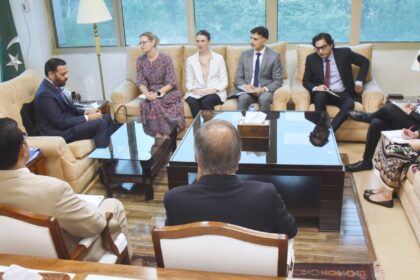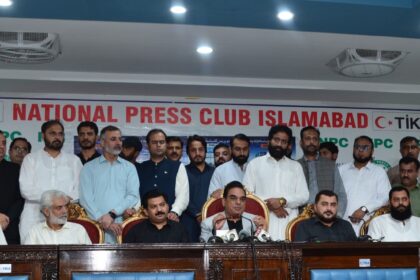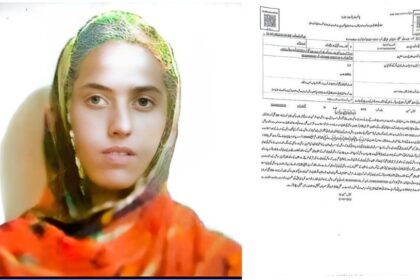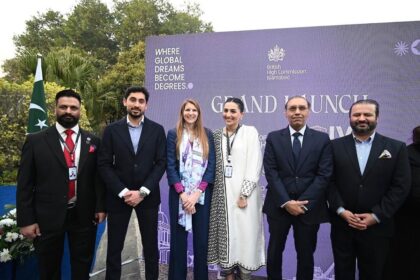**Stakeholders Unite for ‘One Health Pakistan’ Initiative to Tackle Climate and Health Risks**
Stakeholders from across Pakistan’s health, climate, and environmental sectors have agreed to a unified, multi-sectoral strategy under the ‘One Health Pakistan’ initiative to address the country’s escalating health challenges arising from climate change, pollution, and environmental degradation. The consensus emerged during a high-level consultative meeting organized by the Health Services Academy in collaboration with the Ministry of Climate Change and Environmental Coordination (MoCC&EC), bringing together national and international experts for an integrated response to public health threats.
The meeting, held at COMSTECH’s conference room, brought together representatives from prominent organisations including the World Health Organisation (WHO), UN Food and Agriculture Organisation (FAO), Asian Development Bank (ADB), World Bank, and WWF-Pakistan. Experts and stakeholders from the health, environment, wildlife, climate, and development sectors discussed comprehensive approaches to environmental health and pandemic readiness, advancing the One Health Workforce Development agenda for improved pandemic preparedness in Pakistan.
Prof. Dr. Junaid Sarfraz, speaking on behalf of Health Services Academy’s Vice Chancellor Prof. Dr. Shahzad Ali Khan, opened the session, followed by Dr. Tariq Mahmood Ali, National Coordinator of the One Health Project, who outlined the initiative’s objectives and expected outcomes.
Keynote speakers including Federal Parliamentary Secretary for Health Dr. Nelson Azeem, Dr. Syed Mursalin of the Pakistan One Health Alliance, Muhammad Asif Sahibzada, Director General of Environment at MoCC&EC, and Dr. Shabana Saleem, Director General Health, stressed the urgent need for a unified national strategy to respond to overlapping public health and climate risks. Dr. Nelson Azeem emphasized that adopting a One Health approach is vital to protect people, animals, and ecosystems, advocating for a cross-sectoral response aligned with the interlinked nature of these challenges.
During the session, Muhammad Asif Sahibzada warned that unchecked pollution, climate change, and biodiversity loss are contributing to increased zoonotic diseases and antimicrobial resistance, and highlighted that weak institutional coordination could undermine early warning systems and effective response efforts. He called for institutionalizing the One Health framework at all levels of government, underscoring the necessity for strong policy enforcement, cross-sectoral training, and community engagement to bolster national resilience.
Echoing these sentiments, Dr. Tariq Mahmood Ali stated that Pakistan can no longer address human, animal, and environmental health independently, calling for unified action under the One Health platform. Muhammad Azim Khoso, Director (Urban Affairs) at MoCC&EC, recommended setting up dedicated One Health Units within federal and provincial departments, financed by various government and international pandemic funds. These units, he suggested, would facilitate real-time data and rapid responses to disease outbreaks influenced by climate and environmental factors, coordinated through a federal interface.
Muhammad Saleem Shaikh, Deputy Director and environmental advocacy expert at the MoCC&EC, presented a strategic roadmap to enhance stakeholder engagement and advocacy as part of the initiative. He underlined the importance of identifying and building trust among policymakers, health professionals, community leaders, and vulnerable groups. Shaikh called for comprehensive needs assessments to inform advocacy, education, and awareness efforts in the context of climate-induced health risks. He further stressed that effective advocacy should be guided by specific, measurable, achievable, relevant, and time-bound (SMART) objectives, and that outreach efforts must leverage both digital and traditional media, as well as social media influencers and community leaders, to ensure broad awareness and support for the One Health agenda.
A technical session, chaired by Director General Asif Sahibzada, focused on workforce training, inter-agency coordination, and policy innovation. International organisations including WHO, FAO, ADB, World Bank, and WWF-Pakistan offered practical recommendations to move the One Health agenda forward.
Participants concluded the meeting by reaffirming their commitment to transforming these discussions into concrete actions to strengthen Pakistan’s resilience to future pandemics and environmental health risks. This includes investing in integrated surveillance systems and climate-resilient health planning, underscoring the national imperative of One Health Pakistan as the foundation for a healthier and more sustainable future.











